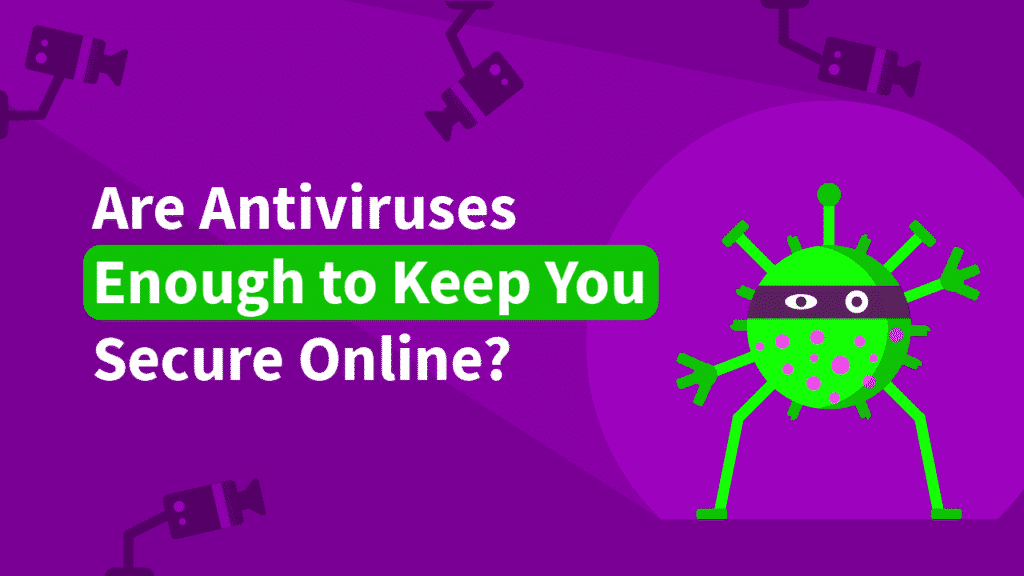Are Antiviruses Enough to Keep You Secure Online?
There is no denying that antiviruses are essential tools for maintaining security on devices. The question is, are they enough to keep you secure online? Moving straight to the answer, while antiviruses are excellent and necessary security tools, they are not enough to keep you secure online. While they are good at handling different malware forms such as trojan horses and worms, new sophisticated threats are being found today on the internet.
In this article, we’ll discuss why an antivirus is not enough to keep you secure online and the right steps to take to prevent threats.
1. Phishing Scams
Though phishing scams have been around for years, an antivirus cannot offer protection against phishing scams. Phishing scams come in many different forms, such as fake emails, pop-up ads, and other methods. The goal is to get the victim to surrender sensitive information such as banking information, credit card accounts, usernames, and passwords. It may sometimes trick the victim into clicking a link or opening a fake website.
One of the most common types of phishing scams is email phishing. A common tactic is to send a dubious link together with the email while disguising it as legitimate. The goal is to get the victim to click the link to the website and provide information that could be used for online financial theft or identity fraud. Since an antivirus cannot protect you against scam mails, the best thing is to avoid links or attachments from suspicious emails. If you receive emails that look legitimate, ensure you double-check as the links attached might be similar to a valid web link.
2. Hacking and Spyware
Antivirus software is not enough to block hackers and spyware from getting into your device. Even while using strong antivirus programs with multi-detection methods, hackers can still access a computer’s files if there is no strong firewall.
To prevent viruses and spyware, you need to put up a strong internet firewall apart from the antivirus. While an antivirus will protect your device from known threats, a firewall can keep your computer hidden on a network. Even if your computer becomes visible to hackers on a network, it prevents them from gaining access.
3. Identity Theft
Identity theft is stealing an individual’s personal information to commit fraud. The perpetrator uses the stolen identity to gain a financial advantage or commit a crime online. Identity theft usually occurs as a result of data breaches. The victim’s personal information is obtained without their knowledge through malicious software or other means.
One of the most common forms of identity theft is identity cloning and concealment. An example is when the identity thief gathers a victim’s photos and personal information and creates fake profiles on social networking sites. There are many other methods used for obtaining and exploiting personal information.
Since antiviruses are not enough to protect you from identity theft, you should try other means to protect your data and privacy. One of these is to avoid sharing sensitive or personal information to strangers online. Also, avoid sharing personal information on suspicious websites as they could be a front to gather your data.
4. Password Theft
Password theft is a common occurrence and often leads to other cybercrimes like fraud and identity theft. Cybercriminals can steal passwords through data dumps, brute force attacks, and phishing attacks. No matter how strong your antivirus is, it cannot protect you from password theft online.
One way to protect yourself from password theft is to avoid saving your passwords on websites. There have been many instances where cybercriminals hacked popular websites and gathered saved passwords.
Also, to stay safe from brute force attacks, ensure you use strong and unique passwords. You can use a reliable password manager to generate and store your passwords. Lastly, never use the same password for multiple accounts online. If one account gets compromised, others could be too.
5. Man-in-the-Middle Attacks
Man-in-the-middle attacks occur when an outsider intercepts communication without the knowledge of the parties communicating. It could happen through email, social media, or websites. A hacker could intercept the communication between you and a website and gather any data you submit to the site.
Examples of man-in-the-middle-attacks include DNS spoofing, HTTPS spoofing, IP spoofing, ARP spoofing, Wi-Fi hacking, and SSL hijacking. Antivirus does not offer protection against man-in-the-middle attacks. Read more about Spoofing here.
One of the ways you can protect yourself is to avoid “http” websites because “https” websites offer more protection. Also, a strong WEP/WPA encryption on access points can defend against such attacks.
Conclusion
It is now clear that antiviruses do not offer full protection against all online threats. Though antiviruses protect against different types of malware and threats, they are not enough to keep you safe online. Explore some of the alternatives and supportive security methods above to bolster your security, alongside antivirus protection.
